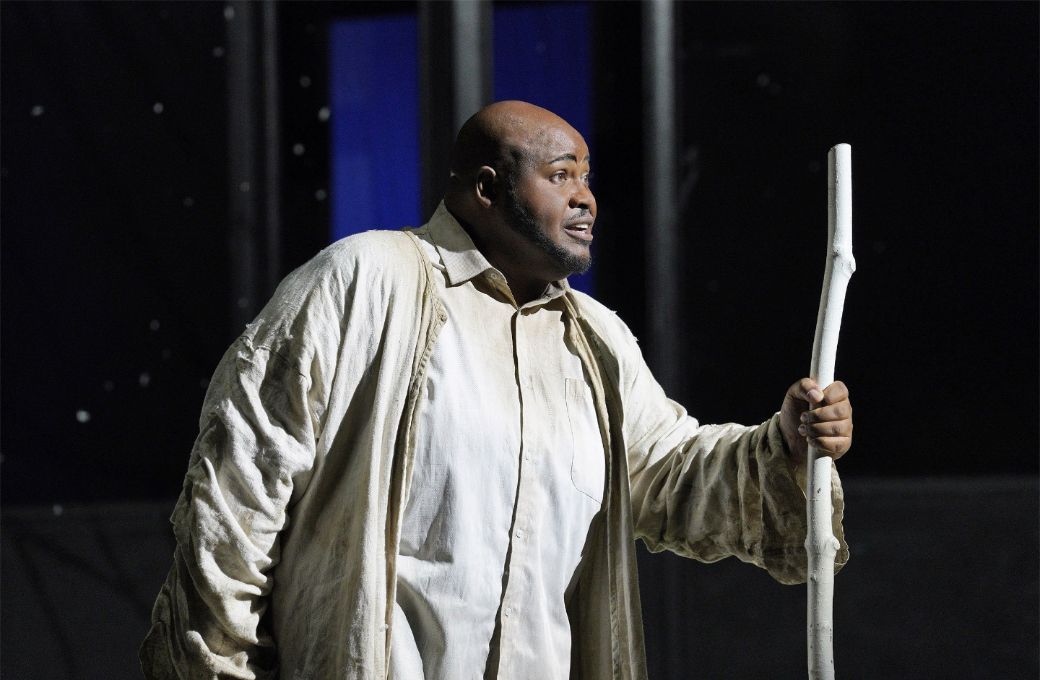The title role in Benjamin Britten’s Peter Grimes represents the Mount Everest of the twentieth century tenor repertoire. It’s a summit Issachah Savage will scale for the first time this October, when he headlines a new production for Dutch National Opera and Ballet. Although Savage has garnered critical success in the music of Wagner, Verdi and Puccini, among others, he didn’t envision himself as a natural fit for Britten’s tortured fisherman.

“I never imagined Peter Grimes would be a role I’d take on,” Savage says in a recent video call from Amsterdam, where he’s in the midst of rehearsals. “Of course, I’ve studied the iconic recordings, especially Jon Vickers’ renowned interpretation, which has become the gold standard. However, I’ve always enjoyed going back as far as possible to the composer’s era to get as close as I could. One recording that stands out is the 1969 version, with Britten conducting and Peter Pears in the role. I could never hope to offer anything like Pears. His sound and interpretation are truly his own, but his portrayal of the role was simply captivating.”
Savage recognized that there are few parts that could be sung by tenors as different as Vickers and Pears. “There’s something in this role for almost every tenor,” he reflects. “From the light, lyrical beauty in the ‘Now the Great Bear’ aria to the more intense, dramatic outbursts in the ‘Hut Scene’, where Grimes is yelling at the boy. Britten wrote it in such a way that the voice is forced to explore so many different shades and colors.”
Initially, Savage struggled with some of the role’s more unsavory aspects. When the opera begins, Grimes – a figure treated with suspicion and even disgust in the small seaside community where he lives – has been cleared in an inquest into the death of his young apprentice. As the story progresses, the audience witnesses him mistreating his new helper, a workhouse boy named John, and pushing away the few neighbors who attempt to befriend him.
“I knew this opera involved the physical abuse of a child, and that was really unsettling for me right from the start,” Savage admits. “I thought to myself, why would anyone write an opera to include something so dark and ugly? And then I remembered, opera deals with all manner of ugliness: killing, cheating, stealing, lying, adultery, incest, betrayal… it is all part and parcel of opera themes. So I began to see it from a different perspective, thank God.”
In order to start building a character, Savage worked to find the humanity inside a troubled, flawed man. “When approaching any character, I always remind myself that no one is entirely one thing all the time,” he says. “People shift and move through different emotions, moods, and phases of life. Peter Grimes is no exception. His changes just seem to happen far more quickly, more frequently and more abruptly than most.
“Everything comes from something,” Savage continues. “If we only focus on the darker unsavory parts, we miss seeing the whole person. With a character as extreme as Peter, you have to ask, ‘What’s behind it all?’ In my research, particularly in the George Crabbe poems, I learned a lot about Peter’s upbringing and family life. His father was incredibly harsh and mean to him. This discovery is what made me feel more compassion for Peter. If we can have empathy for the child, perhaps we can also find empathy for the adult, who is still trying to find a way to dress the wounds of his own scarred inner child. Peter’s childhood was far from easy: his father was cold and unyielding, unable to give Peter a single hug or word of praise. Instead, Peter was taught structure, discipline, and hard work – but never gentleness or warmth.”
“Abuse tends to either replicate itself or it simply destroys,” Savage says. “Peter becomes a reflection of his father, adopting this distorted sense of normal, shaping how he communicates with the world.”
Wishing to maintain the surprise of the new production, directed by Barbara Horáková, Savage remained somewhat tight-lipped about the design elements before the official premiere on 6th October. But he feels that the concept will honor and expand upon the composer’s intentions.
“Barbara paid close attention to Britten’s themes, particularly the overwhelming presence of the sea,” he notes. “It’s not just the characters that will come alive, but their relationships – their reasons for doing what they do. You’ll see a community come to life. Every interaction, every response, especially from characters like Mrs. Sedley, who ends up revealing a deeper struggle, or Bob Boles’ hidden desire to succumb to the very sin he preaches against…”
Unlike the character he portrays, Savage grew up in a tight-knit family in Philadelphia, where he discovered his love of singing at a young age. “I found my voice as a singer through the church, singing the early hymns, as early as four or five years old,” he said. “Church was my first training ground, like many singers. I would go and sing as a representative of the church, if the pastor couldn’t go somewhere.”
It was at the High School for the Creative and Performing Arts, known locally as CAPA, that a teacher opened Savage’s eyes to the possibilities of classical singing. “It was an oasis for me in so many ways, and a catalyst for so many things that were to come in my life,” he says. “David King, my choral director, said to me one day, ‘Issachah, I’d like for you to stay after school.’ I thought I was in trouble! I walked back into the room, and he told me to go to the recorder and press play. Out comes this gorgeous voice that I later learned was Jussi Bjӧrling, singing the climactic phrase from Verdi’s Requiem, the Ingemisco. He just sailed up to this beautiful B flat and caressed it so lovingly.
“David King said to me, ‘Mock him. Do what he did.’ I was terrified to do this because I did not grow up with classical music in my home. But I was enamored with the sounds of this music, even from just the little anecdotal things that would come in through commercials and cartoons. So, preparing to mock Mr. Bjorling I turned away to hide my face, and gave it my best shot. Out came something that was enough to move him. I turned back around and saw Mr. King red in the face, as if he were going to cry. He said to me, ‘Issachah, you see, you have the kind of voice that you can do anything you want with it — even opera!’ Those words were as if he was anointing me or blessing me or something. But it was a bit daunting too, because I believed what he said. It was at that moment that the trajectory of my life shifted towards a professional career in opera and classical music.”
From CAPA in Philadelphia to Peter Grimes in Amsterdam, it’s clear there’s little Savage cannot do.
Issachah Savage sings Peter Grimes at Dutch National Opera and Ballet from 6th October.
This article was sponsored by Dutch National Opera and Ballet.


